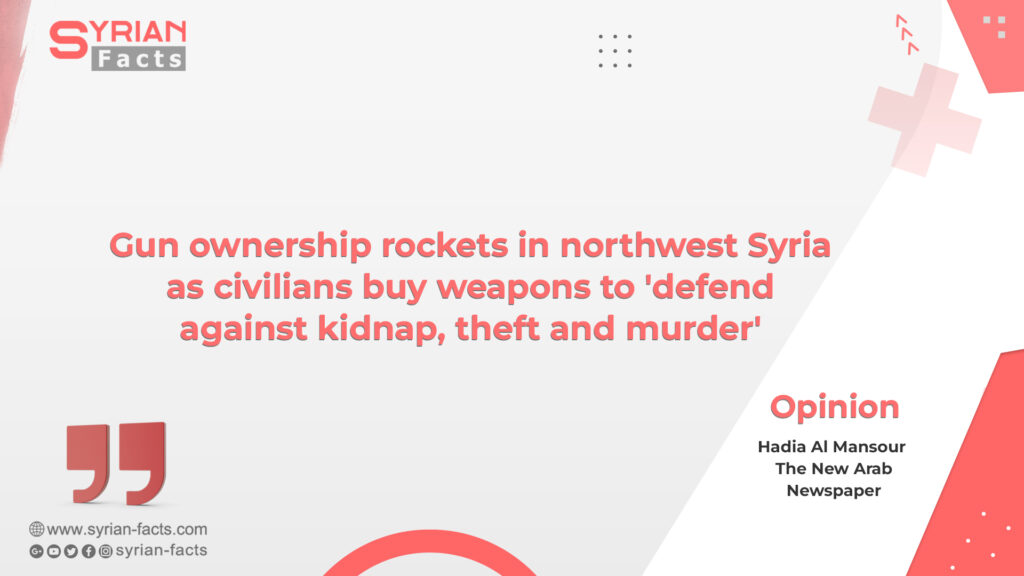After over a decade of war, the opposition-held region of northwest Syria is awash with weapons, many of which have ended up in arms stores and online buy-and-sell groups where civilians can buy without a licence.
An informal and illicit arms trade is rampant in northern Syria, and civilians don’t need licences to buy – a situation generated by a longstanding security vacuum which has created fertile soil for such a development.
This is the case both in regions controlled by the Salvation Government affiliated to Hayat Tahrir al-Sham (HTS), and where the Syrian Interim Government (SIG) affiliated to the Turkey-backed opposition factions reigns.
After over a decade of war, the region has seen the ‘rule of law’ shredded and a complete lack of accountability take root. It has become easy for anyone to illegally obtain arms – the lack of monitoring, and neglect of the de facto authorities to prosecute those involved, or adopt measures to curb the phenomenon, has only exacerbated the rise of this dangerous situation.
Self-defence in a security vacuum
The excuse is self-defence — in the midst of rising incidents of theft, kidnappings and killings – creating a vicious circle by which the spread of arms and arms dealers has become yet another factor feeding into the lack of safety and security plaguing northwest Syria.
On the subject, Fares Shawaf (45), a defecting officer from the regime army who is now a member of an opposition faction living in Afrin, said that most weapons circulating in the region were originally looted from the defeated Assad army forces and are Russian and Iranian in make.
He said to The New Arab that those seized were a mix of light, medium and heavy arms: “We took control of many regime checkpoints in the past, and fully-stocked weapons depots, before the Syrian regime called on the Russian forces and took control of most of the opposition-held regions south of Idlib and north of Hama, and the fighters and factions kept what they had previously seized, and took them to the areas they fled to in northwest Syria.”
The beginning of the trade
After the battles calmed, he says, some “reckless” commanders started selling small arms like pistols and rifles to traders who began selling them to civilians at various prices – in time they were accessible to anyone who requested.
Shawaf doesn’t deny the significant quantity of weapons imported from states like Turkey, India and some Arab states he doesn’t name, which have been imported via weapons traders who bring them into the region after paying a lot of royalties and taxes to the current authorities, however, he believes they are much fewer than those seized from regime forces.
For a while, and until recently, weapons stores had opened in the markets of Idlib and in the rural areas of Aleppo and openly sold small arms, ammunition, hunting weapons, military clothing and wireless equipment.
On the reasons pushing civilians to buy weapons, Jaber Fadel, a civil activist in Jindires city, northwest of Aleppo, says self-defence in light of the prevailing security void is the main reason, though some have other motives, like vengeance or to use them to brag and intimidate.
Fadel criticises the unprecedented and indiscriminate spread of weapons and the lack of any regulations to curb it. He says hardly a day passes without one or more accidental death, in which various weapons have been used, from pistols to rifles and even medium-sized machine guns, in addition to explosive devices, which are no longer used exclusively by the armed factions, but are being resorted to settling personal and tribal scores too.
He says arguments frequently break out where you see civilians pull out guns and start brandishing them, especially in the IDP camps. Likewise, accidental killings from guns being fired on special occasions have risen, resulting from low awareness among civilians of how dangerous this is, especially among children or teenagers who aren’t sufficiently knowledgeable about how to use these weapons safely.
The human cost
Twenty-something Rawan Alkiyal, who lives in an IDP camp in Afrin, was injured by a stray shot fired by her little brother when he got hold of a handgun which their father owned. The gun was kept in a wardrobe, but the boy managed to get hold of it and fired it at random. A bullet hit Rawan’s lower back, paralysing her immediately.
Rawan says the bullet from her father’s gun has ended all her dreams – she had wanted to complete her studies and was looking forward to life before she woke up to the nightmare of chronic disability and ill health.
While Rawan has been left disabled by the proliferation of weapons ownership among civilians, Farida al-Huloum’s (25) story is even more tragic. She was murdered by her husband after a quarrel flared up between them. She had asked for a divorce due to her husband’s abusive and violent behaviour, and in response he shot her in the chest, killing her.
Farida’s mother said that over two months passed before the crime was revealed after her husband hid her body by hiding it in their home.
She said her daughter’s husband had often bragged about having a weapon which never left his side and laments the authorities’ failure to arrest him until this moment.
Likewise, pharmacist Bara Al Aklah was killed in Sarmin by a stray bullet after a dispute erupted between several men outside his pharmacy before one of them pulled out a gun and started shooting in all directions – one of the bullets hit the pharmacist in the head and killed him.
The New Arab Newspaper









Be the first to write a comment.